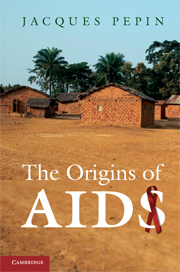Book contents
- Frontmatter
- Contents
- Figures, maps and table
- Acknowledgements
- Abbreviations
- Note on terminology
- Introduction
- 1 Out of Africa
- 2 The source
- 3 The timing
- 4 The cut hunter
- 5 Societies in transition
- 6 The oldest trade
- 7 Injections and the transmission of viruses
- 8 The legacies of colonial medicine I
- 9 The legacies of colonial medicine II
- 10 The other human immunodeficiency viruses
- 11 From the Congo to the Caribbean
- 12 The blood trade
- 13 The globalisation
- 14 Assembling the puzzle
- 15 Epilogue
- References
- Appendix Classification of retroviruses
- Index
12 - The blood trade
Published online by Cambridge University Press: 05 June 2012
- Frontmatter
- Contents
- Figures, maps and table
- Acknowledgements
- Abbreviations
- Note on terminology
- Introduction
- 1 Out of Africa
- 2 The source
- 3 The timing
- 4 The cut hunter
- 5 Societies in transition
- 6 The oldest trade
- 7 Injections and the transmission of viruses
- 8 The legacies of colonial medicine I
- 9 The legacies of colonial medicine II
- 10 The other human immunodeficiency viruses
- 11 From the Congo to the Caribbean
- 12 The blood trade
- 13 The globalisation
- 14 Assembling the puzzle
- 15 Epilogue
- References
- Appendix Classification of retroviruses
- Index
Summary
In this chapter, we will examine the possibility that, during the early stage of the Haitian epidemic, a commercial enterprise in Port-au-Prince exponentially and parenterally amplified the number of HIV-1-infected individuals and allowed the virus to thrive. More generally, we will review the role of the blood trade in the globalisation of HIV-1. But first, we need to understand how viruses can be transmitted, not only from donor to recipient, but also from one donor to another during the handling required to prepare certain blood products. The word ‘donor’ is somewhat misleading here because we are talking mostly about people paid for their ‘donations’.
Blood is made of cells (red blood cells, white blood cells and platelets) and plasma, its liquid component. Plasma is made of water and proteins: antibodies, clotting factors and albumin. When a donation is made, the various components are separated to maximise their use. Patients with anaemia or acute blood loss need only receive the red blood cells, those with a low platelet count will be given the platelets and so on. Plasma is highly valuable as it contains many proteins. Therapeutic use of plasma started during WWII as an expander of intravascular volume, to increase quickly blood pressure in patients with serious bleeding. Subsequently, other uses of plasma components were developed, which required the selective processing of specific proteins: albumin (to expand intravascular volume or to patients with low albumin levels), coagulation factors (haemophilia or other coagulation disorders) and immunoglobulins (patients with immune deficiencies or to protect travellers against hepatitis A).
- Type
- Chapter
- Information
- The Origins of AIDS , pp. 197 - 208Publisher: Cambridge University PressPrint publication year: 2011



